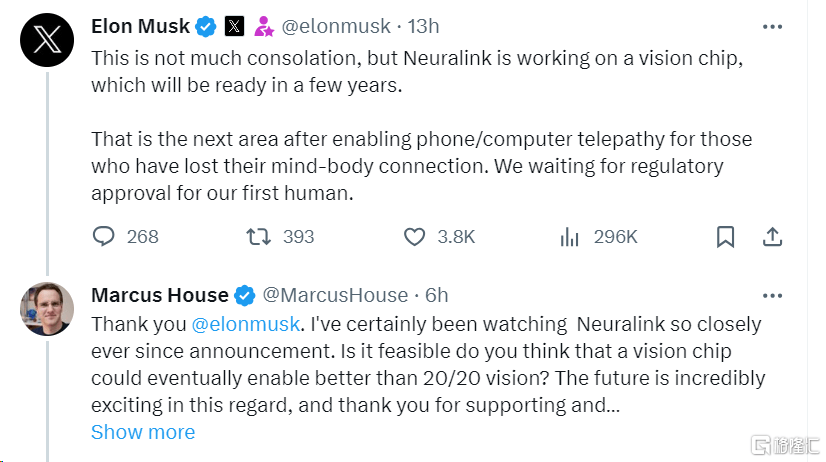
Science fiction has become a step closer to reality, and Musk has another big news.
This breakthrough is no longer a rocket or a large artificial intelligence model, but a new development in brain-computer interface technology
On Tuesday, local time, Musk announced on the X platform that his brain-computer interface company Neuralink is developing a product called a vision chip, which is expected to be available within a few years. It is reported that this chip can help visually impaired people regain their sight
Visual chip implantation
Marcus House, a well-known Australian media person, posted on social media that his 14-year-old son was almost completely blind in both eyes due to CRB1 retinal dystrophy. The disease is so rare that he sought help online
Subsequently, Musk replied to this post:
Neuralink is developing a vision chip that will be ready in a few years. This is the next frontier after enabling phone/computer telepathy for those who have lost the connection between mind and body. We are awaiting regulatory approval for our first human subject.

In 2016, Musk founded Neuralink with seven scientists and invested US$100 million in a neurotechnology company dedicated to developing brain-computer interface technology
Currently, Neuralink is developing a brain chip that will help paralyzed people move and control external devices through their thoughts, thereby restoring their autonomy
Neuralink is looking for the first volunteer willing to remove part of their skull so robotic surgeons can insert thin wires and electrodes into their brains, Bloomberg reported.
Among them, ideal candidates are quadriplegic adults under 40 who will undergo a procedure that involves implanting a chip with 1,000 electrodes into the brain.
After surgeons removed part of the skull, a 7-foot-tall robot (dubbed "R1") equipped with cameras, sensors and a needle began its work. It strives to avoid blood vessels and push 64 wires into the brain. Each wire is about 1/14 the diameter of a human hair and is lined with 16 electrodes. These electrodes are programmed to collect data about the brain
Musk’s big ambition
Prior to human trials, Neuralink has completed trials on animals such as pigs and monkeys over the past two years and successfully conducted 155 implant experiments
In May of this year, Neuralink said it received approval from the U.S. Food and Drug Administration (FDA) for its first human clinical trial. At the time the company was already under federal scrutiny for its handling of animal testing. In August, Neuralink raised $280 million in Series D funding led by Founders Fund.
In September this year, Neuralink announced that it would conduct the first human trial of a brain-computer interface this year and began recruiting personnel for its first human trial.
At the time, Neuralink stated that the purpose of the research was to test the initial functionality of its brain-computer interface to allow paralyzed patients to control external devices through their thoughts. Additionally, the company added that the study will take "approximately" six years to complete
Neuralink had planned to implant its device in 10 patients, but the company is in talks with the FDA to reduce the number of patients after the agency raised safety concerns. However, it is unclear how many patients
the FDA ultimately approvedNeuralink co-founder and VP of Engineering DJ Seo said:
"The company's short-term goal is to build a universal brain interface and restore autonomy to people with neurological diseases and unmet medical needs. In fact, the long-term goal is to benefit billions of people, unlock human potential and transcend our Biological abilities.”
Musk has grand ambitions for Neuralink, saying it will facilitate the rapid surgical insertion of its chip devices to treat diseases such as obesity, autism, depression and schizophrenia.
Currently, thousands of potential patients have shown strong interest in Neuralink
Neuralink estimates that each implant procedure costs about $10,500, including exams, parts and labor, and bills insurance companies about $40,000. In addition, the company expects annual revenue to reach $100 million within five years.
The company said it plans to perform 11 surgeries in 2024, 27 in 2025 and 79 in 2026. The number of surgeries will then really increase, from 499 in 2027 to 22,204 in 2030, according to documents provided to investors.
The above is the detailed content of Musk 'officially announces' brain-computer interface recruitment! Chip implanted in the brain, human trials will start next year. For more information, please follow other related articles on the PHP Chinese website!




